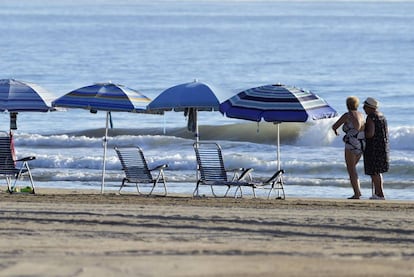Umbrella wars: staking out your claim on a Spanish beach
Authorities around Spain are fining people who use parasols to reserve spots on busy strands

Every day, as dawn breaks, a silent battle commences on Spain’s busiest beaches: securing a spot as close as to the water possible. Starting at 7am, hundreds of people stake their claims in the sand with umbrellas – and sometimes chairs, tables and coolers too – before heading out to enjoy the water. Sometimes, they don’t return for hours. More and more complaints from residents and vacationers alike have led authorities of coastal Mediterranean communities to declare war on this “spot saving” by passing new ordinances or enforcing existing ones. “We’ve decided to go one step further and have local police remove these objects, which are turning a public space into a private space in the earliest hours of the morning,” says councilman José Manuel Prieto of Gandia in Valencia, the latest city where these regulations have been set into motion.
The measure has been well received by the majority of vacationers, according to Prieto and confirmed by various residents. “I take a walk here every morning, and I see a lot of older people coming and basically setting up fences, all at the very front by the water. And I don’t think it’s right,” says Carlos Peiró soon after leaving the water.
Eusebio Sánchez, who is 73, sees the logic in the prohibition even though he admits that he too has often left an umbrella speared in the sand to reserve his family the closest spot to the water. The vacationer, who comes from Toledo every summer, adds: “If the city council is doing it so the machines that smooth out the sand don’t run into issues with umbrellas, I’ll be the first to jump on board. However, if they’re doing it so they can collect fines and make more money, I don’t think that’s reasonable.”
The authorities want to prevent umbrellas from turning public beaches into private spaces before the sun is even up
In Gandia, a town whose population grows from 75,000 in the winter to 300,000 in the summer, the mere announcement has led to the overnight disappearance of the umbrellas – at least for now. Vacationers have complied with the rule change even before authorities have had to remove any umbrellas or issue any fines, which can run as high as €720. “The spreading news of the ordinance has set an example, which is exactly what we wanted, but we couldn’t achieve it just with a month of giving the people information,” the councilman reports.
Since the new rule came into effect last Tuesday, the number of umbrellas and shades set up early in the morning has diminished, and the ones that do appear on the beaches aren’t abandoned, instead left with someone standing guard nearby. But combating this phenomenon isn’t easy. In Torrox, a beach town in Málaga, where the umbrella sanctions have been in effect for two summers now, and where the recovery of umbrellas removed from the beach costs €30, simple deterrence hasn’t been enough. According to Pablo Escobar, local police spokesperson, “not everyone agrees. The last time we enforced the rule, there were people yelling insults at police from the balconies.” The neighboring town of Algarrobo and Granada’s Almuñécar have followed in Torrox’s footsteps.
In addition to the early-bird spot-claimers, another phenomenon that conflicts with local regulations can be observed in Torrox. “There are people that go to eat around midday and leave their things on the beach, or cool off with a nap in their house and come back around 6 or 7pm. And we’re taking action,” Escobar says.
Whose umbrella is it anyway?
According to Spain's regional governments, removing unattended umbrellas (after checking that the owners haven't just stepped away) isn't a problem, especially early in the morning. The challenge comes with issuing the fine; unlike cars, umbrellas don't come with identification. "You can only fine someone if they come back to claim the umbrella. And since it can cost up to €300, depending on the circumstances, the offending umbrella owner is better off abandoning it and buying another."
Towns such as Gandia are planning to implement much higher fines, up to €720, but the city council hopes to not have to issue them. "The initiative's intention is to dissuade rather than to punish," says Prieto. "We're doing this for the community spirit, to guarantee that everyone can enjoy the beach under the same conditions."
The deterrence measures haven’t been in place for very long in Torrevieja (Alicante), which last year removed the first umbrella and gave its owner a €150 fine. “It worked for a while. But this summer they’ve filled the beaches again,” says the mayor, José Manuel Dolón. The councilman admits that they haven’t taken action yet, out of fear that it would mean declaring war on the packed beaches. “We will, though. It’s unacceptable to claim public space like this.” According to sources from various regions, the people who use the umbrellas to stake out their territory at the break of dawn tend to be older, mostly men, who come on family trips every summer to the same tourist destination, often to the same part of the beach.
This problem doesn’t exist in Mallorca, where the hotels have a stronger presence and tourists “use more rental umbrellas and sun loungers,” says the city council. Salou in Tarragona, where beach cleaning starts at 5am, also doesn’t face the issue. “At that time, the machines don’t run into umbrellas. And up to now we haven’t thought it necessary to regulate them,” says a spokesperson.
The measures to tackle this practice are spreading rapidly, on the other hand, along the Valencian coast. Sagunto has begun to regulate unattended umbrellas. Alicante and Benidorm prohibit placing them before 8am, as does Cullera, a tourist apartment destination in Valencia. The Cullera councilman who oversees the beaches, Salvador Tortajada, describes his daily struggle: “Once the machines finish cleaning, there’s a race to see who can grab the first spot. Some groups are organized so that one person guards everyone else’s things. There are also those people who mark out their plot of sand with the umbrella pole.”
Sign up for our newsletter
EL PAÍS English Edition has launched a weekly newsletter. Sign up today to receive a selection of our best stories in your inbox every Saturday morning. For full details about how to subscribe, click here
English version by Allison Light.
Tu suscripción se está usando en otro dispositivo
¿Quieres añadir otro usuario a tu suscripción?
Si continúas leyendo en este dispositivo, no se podrá leer en el otro.
FlechaTu suscripción se está usando en otro dispositivo y solo puedes acceder a EL PAÍS desde un dispositivo a la vez.
Si quieres compartir tu cuenta, cambia tu suscripción a la modalidad Premium, así podrás añadir otro usuario. Cada uno accederá con su propia cuenta de email, lo que os permitirá personalizar vuestra experiencia en EL PAÍS.
¿Tienes una suscripción de empresa? Accede aquí para contratar más cuentas.
En el caso de no saber quién está usando tu cuenta, te recomendamos cambiar tu contraseña aquí.
Si decides continuar compartiendo tu cuenta, este mensaje se mostrará en tu dispositivo y en el de la otra persona que está usando tu cuenta de forma indefinida, afectando a tu experiencia de lectura. Puedes consultar aquí los términos y condiciones de la suscripción digital.









































